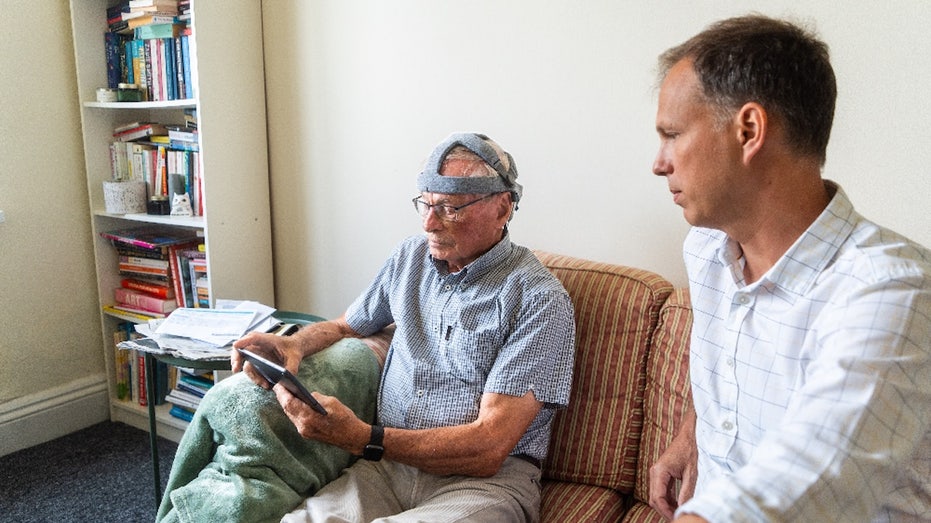Early Alzheimers signs detected in 3 minutes with new brainwave test
A new brainwave test could detect early signs of Alzheimers years before diagnosis in just three minutes.Thats according to researchers at the University of Bath and the University of Bristol, who recently tested the new technology called Fastball EEG in patients homes.The three-minute test records electrical activity in the brain as the person looks at a series of images. It is designed to pick up on signs of mild cognitive impairment (MCI), which often precedes Alzheimers.DEMENTIA RISK SLASHED WITH ONE COMMON HEALTH INTERVENTION, STUDY FINDSBecause Fastball is a "passive" EEG test, it automatically picks up on the brains responses without requiring the participants to answer questions or recall information.This makes it less likely to be influenced by factors such as anxiety, education, culture or language, according to study lead Dr. George Stothart, a cognitive neuroscientist in the Department of Psychology at the University of Bath."Fastball is sensitive to both pre-diagnosed Alzheimers disease and individuals at very high risk of developing it," Stothart told Fox News Digital. "Importantly, EEG data collection for Fastball is entirely feasible in peoples homes, making it a practical tool for real-world use."In the trial, 53 patients with mild cognitive impairment and 54 healthy older adults were tested with the tool to gauge their memory skills. They were then re-tested after one year.OMEGA-3 MAY HELP TO PROTECT WOMEN FROM ALZHEIMERS DISEASE, NEW STUDY SAYSThe patients with MCI were found to have "significantly reduced" memory-related brain responses compared to those without any cognitive decline.The findings were published in the journal Brain Communications."We were pleasantly surprised by the test-retest reliability in healthy older adults," Stothart said. "In the one-year follow-up, measurements remained stable, indicating that for healthy older adults, Fastball provides consistent results over time."The main limitation, according to Stothart, is that the researchers didnt have biomarker data for participants with MCI due to cost and resource constraints."However, our larger ongoing clinical validation studies in the U.K. and U.S., each involving 1,000 patients, now include extensive biomarker coverage," he noted.The hope is that the tool can be rolled out for use in doctors offices, memory clinics or homes, helping to enable earlier Alzheimers diagnoses.STUDY REVEALS WHY SUPER AGERS MAINTAIN OUTSTANDING MEMORY INTO THEIR 80SThat could allow patients to get earlier access to key Alzheimers drugs, like donanemab and lecanemab, which are most effective earlier in the disease progression, researchers said."Patients themselves do not receive the Fastball results directly," Stothart said. "Instead, results are provided to the clinician, who integrates them into a broader diagnostic assessment.""Fastball is another valuable tool that clinicians can choose to include as part of their diagnostic battery."Christopher Weber, Ph.D., senior director of global science initiatives at the Alzheimer's Association in Chicago, said this technology has potential as a non-invasive tool for the detection of memory changes that could indicate the early stages of Alzheimers disease."However, more research is needed before this could be considered for inclusion in the diagnostic toolbox for Alzheimers," Weber, who was not involved in the study, told Fox News Digital."This includes confirmation of these findings in larger, more representative study populations, over longer periods of time, where tests are done to confirm that study participants have brain changes related to Alzheimers."Weber also pointed out that this technology does not appear to determine the cause of the memory loss."As a result, it is unclear what the results of this test may mean about your Alzheimers risk and/or your health status," he said. "So even if this tech proves itself with further research, it is still likely that additional tests, looking at disease-related biomarkers or imaging of the brain, would also be needed to inform treatment or risk reduction."CLICK HERE TO SIGN UP FOR OUR HEALTH NEWSLETTERDespite the limitations, Weber said Fastball may prove to be valuable for initial screening or to inform a patients conversations with their doctor."And it could be valuable to investigate how this technology could complement other diagnostic methods, such as PET scans, blood tests and paper-and-pencil cognitive assessments," he added.Any future use of at-home screening or testing should be done in a "careful and controlled way," Weber advised.He added, "When considering any Alzheimers- or dementia-related testing, it is important to have a conversation with your healthcare provider to see if you are a candidate."For more Health articles, visitwww.foxnews.com/healthThe study was funded by the Academy of Medical Sciences and supported by dementia research charity BRACE.




